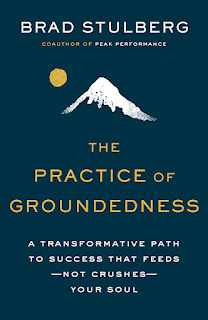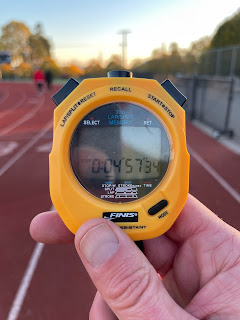Book Review - The Practice of Groundedness
On Twitter, I'm not much of a poster, or influencer as one might say, but I do use Twitter to follow content on topics that are interesting to me, such as Sports Science. One such person I follow is Steve Magness and the other day he promoted a book by Brad Stulberg called The Practice of Groundedness. The premise of the book is that high achievers are prone to what Stulberg calls heroic individualism - "...an ongoing game of one-upmanship, against both yourself and others, paired with the limiting belief that measurable achievement is the only arbiter of success." Stulberg sums it up as, "...chronically feel(ing) like you never quite reach the finish line that is lasting fulfillment."
I thought this book would be about athletic performance and in a way it is, but it's also much broader than that. Really, it's about human performance in all walks of life. Stulberg goes on to describe his own experience with being diagnosed with Obsessive Compulsive Disorder (OCD) and how that journey led him towards what would eventually become what he calls Goundedness - "...an unwavering internal strength and self-confidence that sustains you through ups and downs."
To be grounded is to practice the 6 Principles of Groundedness:
- Accept where you are to get you where you want to go. Seeing clearly, accepting, and starting where you are. Not where you want to be. Not where you think you should be. Not where you think you should be. Not where other people think you should be. But where you are.
- Be present so you can own your attention and energy. Being present, both physically and mentally, for what is in front of you. Spending more time fully in this life, not in thoughts about the past or future.
- Be patient and you'll get there faster. Giving things time and space to unfold. No trying to escape life by moving at warp speed. Not expecting instant results and then quitting when they don't occur. Shifting from being a seeker to a practitioner. Playing the long game. Staying on the path instead of constantly veering off.
- Embrace vulnerability to develop genuine strength and confidence. Showing up authentically. Being real with yourself and with others. Eliminating the cognitive dissonance between your actual self so that you can know and trust your true self, and in turn gain the freedom and confidence to devote your energy to what matters most.
- Build deep community. Nurturing genuine connection and belonging. Prioritizing not just productivity, but people too. Immersing yourself in supportive spaces that will hold and bolster you through ups and downs, and that will give you the chance to do the same for others.
- Move your body to ground your mind. Regularly moving your body so that you fully inhabit it, connect it to your mind, and as a result become more firmly situated wherever you are.
Many of these principles resonate with how I approach cycling as a Masters athlete. For me, it always starts with acceptance - closing the gap between wishful thinking and reality. Stulberg states that happiness = reality - expectations. That makes a lot of sense to me. I started my cycling journey a bit more than two years ago on the ground floor. I knew that if I wanted to be any good at it, it would take time to build the right muscle mass, to improve my aerobic capacity, to establish fueling strategies on long rides, etc. All of that takes time and any ambition of being a competitive Masters athlete means that I'd be lining up next to former pros and athletes with decades of experience in the sport. When I started working with my coach, Patrick Walle, I told him of my goals that were 2+ years out. That long-term mindset came from years of running and seeing how long it took for improvement to come. You have to love the process because if all you love is winning, you'll be sorely disappointed.
I was reminded of a recent poll that found that 40% of Americans think they're fit enough to compete in at least one Summer or Winter sport at the Olympics. Unsurprisingly, dudes had 3 times more confidence than females with 60% of males thinking they're fit enough. With 42% of American adults obese, this would indicate that accepting where you are is less common that one might think.
The rest of the principles, of course, made sense. The author did a good job of lacing in references, studies, and anecdotes to reinforce why any given practice was worthy of being a principle. The one that I initially had trouble with was around building a community. I think if we allow ourselves to have latitude on the definition, then it makes sense to me. One of the joys of cycling is doing it with others. In Seattle, I have a small group of friends, our so-called Sin Frenos faction, that rides together often. When you dedicate 10+ hours per week to a hobby, that's a lot of time with anyone outside of your family. Having a group that can lift each other up provides a lot of motivation and enjoyment, especially in those Winter months in Seattle where the weather is lousy and all that's left is Zwift.
Overall, the book is a good read and Stulberg was kind enough to end the book with an extensive Recommended Reading section that will now make it onto my GoodReads lists.



Comments
Post a Comment